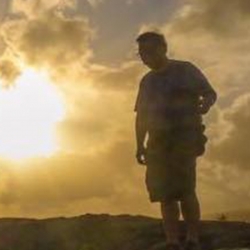An Ode to Independence Day, Laguna Beach, 2007
by Garrett Hongo
I hear America singing, the varied carols I hear…
—Walt Whitman
We came like a tide swelling to the shore except from inland—
places named for saints in Spanish, a realtor’s dream, a field of oranges,
and, nostalgically, a town planned for post-Civil War elites
seeking refuge from a Chicago rife with newcomers—
Santa Ana, Lake Forest, Anaheim, and Garden Grove.
Our sleek cars, metallic sharks, cruise the streets and nuzzle curbsides,
steel skins ticking as the air cools in the onrush of the evening chill,
sand and salt in a light haze over insolent, candy-flake paints.
It’s the Fourth in Laguna Beach and we’ve spent the afternoon
strolling the boardwalk from the bluffs to the basketball courts,
past the eponymous hotel and rows of cheap motels with capricious names,
eating over-salted popcorn and lapping our drools of ice cream.
It’s almost amnesiac, this dry equinoctial day
fading to fireflame glimmers of light
that burst from all the west-facing windows along the shore,
splashing like a sudden semaphoric spume of a traveling wave
crashing against a shoreline inlet of rocks sculpted slick by the sea,
spilling one season into another, one year into ten,
and my decades of penitential wandering into this single night.
In 1984, still a stranger to this privileged world of beaches,
suburbanites, and their forgetfulness, I cast my ballot
in a spring primary for the candidate of the Rainbow Coalition,
Jesse Jackson, a preacher who’d once stood in vain protection
over the Reverend Dr. King slain on a hotel balcony in Memphis in 1968.
Jackson had spoken of the solidarity of peoples,
voice hectoring and climbing in anaphoras and chants
into a stirring oratory I was moved to hear even via television.
His opponents were both drab and toney—Walter Mondale,
a homespun Minnesotan once V.P. and obviously the party’s choice,
and Gary Hart, the junior senator from Colorado
with blow-dried hair and a platform of “New Ideas.”
Not yet disgraced (that was yet to come, photos
trysting on a yacht, the bikini-clad girlfriend in his lap),
Hart was image-over-substance and espoused only vaguely,
while Mondale skewered him, crying “Where’s the beef?”
live and on-camera during a televised debate. The laughs killed him,
but I admit I might have gone for the man in the teased hair
except for the preacher who urged us to rally around the suffering,
show our strength joining hands across neighborhoods and races
so we could uplift the world as a rainbow does the earth,
rising in an arc of many colors over beaches, bluffs, and canyonlands.
The next morning, when I drifted back to the polling station
(it was my public library), I’d hoped to see the full tally posted.
I knew my man would not have won the precinct—an entire city—
but I wanted to gauge the showing his hopes had made in my neighborhood.
There was a long sheet of squash-yellow cardstock
taped to a window of the library annex a half-block away,
and I ran my eyes down to the report line for Lido, #53-075,
my little beachy arondissement highlighted in a trailing spoor of red
from a marker, then circled with a flourish in case you missed it.
There were a hundred plus for Mondale, nearly eighty for Gary Hart,
and even a sprinkling for McGovern in his last hurrah. But there,
starkly, was the number “1” beside Jackson’s name—a single vote.
I thought to myself, How could?—then realized I was alone
among the sand-footed citizens in this county of white flight,
my values islanding me in a wide sea of beliefs counter to mine.
Yet, now beside these evening throngs who crowd against the barriers
and trample the tough lawns of grass beside the Coast Highway,
I hear a multitude speaking languages of murmur and glee
as a bottle rocket screams a Mexican grito overhead
and streaks a trail of sparks and smoke across the ash-gray sky
like a ribboning pathway among the zinc shades of the Absolute.
As the first blooms of light burst in silver showers crackling over the crowd,
their faces upturning like dishes of anemones toward the surface of the sea,
there are cascades of American oos and ahhs and shrieks I’d have expected,
but something more subtly interfused as I move alongside the bustle
is a staccato phrase of Hindi commingled with a melodious babble I think is Farsi,
sing-songs of Brazilian Portuguese against dipthongs of Vietnamese and Hmong.
I spot a child in a festival dress that seems made of ribbons,
red and bright yellow stripes over a flare of purple satin.
She spins on her heel and weighted spangles dart from her braided hair.
Her mother, dressed more simply in a monochrome silk sari
and gold-sequined slippers, gathers her in the shrouds of her arms,
and she blends like a swirl of gaudy paint back into the crowd.
The sky has darkened now, not quite to ink,
as gigantic dandelions of light billow then descend,
drooping downwards like silvered ganja-locks on a sparkling willow tree.
No desire is individual tonight as, through these impromptu rituals,
we have found a gathering commune of amity and celebration
that looks beyond the artificial fires we have produced
toward the true stars of our most humane ambitions:
to laugh aloud and feel welcome as we clap someone on the back
named unlike ourselves—José to Shahid, Maha to Mehran—
that we become the luminous dustfall of new identities,
whorls of efflorescence speckled with the afterimages
of our earnest faces and the charitable lights that lit them.
Published on July 1, 2017

